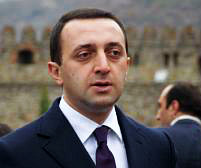
TBILISI, DFWatch–Georgia’s Association Agreement with the EU will be signed by the prime minister, although he is not the head of state.
In all of EU’s 28 member states, the Association Agreement with Georgia will be signed by the head of state, which usually means the president. But not in Georgia. People see this as a result of a confrontation between the president and the prime minister.
Minister for Euro Atlantic Integration Alexi Petriashvili announced the decision on Wednesday, after a joint press conference between the PM and the president of the European Council, Herman Van Rompuy.
“The Georgian government takes the responsibility to implement the Association Agreement. The Georgian government is responsible for what it negotiated with the EU. So the head of government will sign the Association Agreement,” Prime Minister Irakli Gharibashvili said.
Georgia and the EU will sign the Association Agreement in Brussels on June 27, at a gathering of heads of EU member states.
Foreign Minister Maia Panjikidze did not specify who will sign the agreement from the Georgian side. Also, she didn’t say whether the president will be part of the Georgian delegation. The PM only said that Georgia will sign the agreement.
Who will sign the agreement has become a contentious issue after it was decided that it would be signed in June. The Constitution says the president as head of state signs international agreements, although he needs the agreement of the PM, who is head of government.
About two months ago, former Prime Minister Bidzina Ivanishvili said that he is dissatisfied with the president because Margvelashvili hosted ambassadors at the president’s palace.
Earlier, Margvelashvili used to say that the palace, which was built by Mikheil Saakashvili, is so pompous that the country doesn’t have time for such luxury. This reason seemed unreasonable, and people suspected that there was disagreement within the government. Ivanishvili’s statement strengthened this suspicion.
In addition, the government wants to take power away from the president which were left after a constitutional amendment in which the power of the prime minister was increased while that of the president was increased. Moreover, PM Gharibashvili has lately avoided Margvelashvili.
On Tuesday, Gharibashvili didn’t attend a dinner organized at the president’s palace to host French President Francois Hollande, and this was seen as an expression of the split. The PM and his administration didn’t explain why he was absent. The government’s opponents saw this as a violation of protocol and disrespect toward the guest.
When it comes to the Association Agreement, the Constitution says that the president must sign it. The National Movement party claims that it may be considered unconstitutional if the PM signs the treaty, and they imply that this is done deliberately in order to interrupt the signing.
“This is a violation of the Constitution, which in the best case happens because of internal intrigue and confrontation, but may be used after some period of time. They may declare illegitimate the signing of the Association Agreement and abolish the agreement. I want to hope that those in government who acknowledge such a threat will take all measures in order to avoid this, for the country,” UNM spokesperson and former minister of euro integration Giorgi Baramidze said.
The government has not yet commented. Members of parliament from the ruling coalition say it is important to sign the agreement and that it doesn’t matter who signs it.
However, constitutional experts disagree. One of them, Vakho Menabde, told DF Watch that everything matters in international agreements, also who signs them.
He says that the argument that the PM should sign it because the government took the responsibility is not serious because implementing international agreements is the prerogative of the government.

